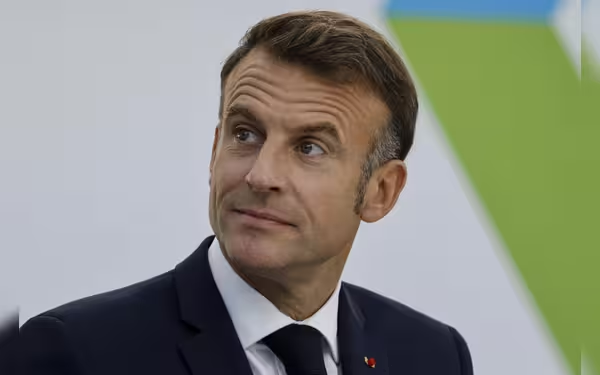Saturday, November 16, 2024 10:02 PM
Macron Advocates for Positive Immigration Perspective in France
- Macron states immigration is not inherently bad.
- Immigrants contribute significantly to economies.
- Debate continues between Macron and new government.
 Image Credits: arabnewspk
Image Credits: arabnewspkMacron asserts immigration is not bad, highlighting its economic contributions amid rising tensions in France.
In recent discussions surrounding immigration, French President Emmanuel Macron has made a significant statement, asserting that immigration is not inherently a "bad" thing. This comment comes amid a backdrop of increasing tension regarding immigration policies in France, particularly in light of the hard-line stance taken by the new interior minister, Bruno Retailleau. Macron's remarks were made during an interview with broadcaster France Inter, where he emphasized the complexity of the immigration issue.
Macron stated, "Is immigration bad? The answer is no. It depends." This nuanced perspective highlights that the implications of immigration can vary greatly depending on the context. He further elaborated, questioning whether immigration from Africa is bad in general, and concluded that it is "not totally" negative. This statement reflects a broader understanding of the contributions that immigrants make to society.
During the recent "Francophonie" summit, which brought together leaders from French-speaking countries for the first time in 33 years, Macron pointed out the significant financial contributions that immigrants make to their home countries through remittances. He noted that the African continent receives more from these remittances than from European public development aid, stating, "Shame on us." This acknowledgment of the economic impact of immigration underscores the importance of viewing the issue through a multifaceted lens.
Macron also highlighted the strength that foreign-born individuals bring to France, mentioning that there are millions of dual nationals and many French citizens of immigrant origin. He referred to this diversity as "our wealth" and a source of strength for the nation. However, he recognized the challenges posed by illegal immigration and human trafficking, stating, "The difficulty at the moment is how we manage to fight against human traffickers, these illegal immigration networks."
In contrast, the new right-wing government, led by Prime Minister Michel Barnier, has committed to tightening immigration controls and combating human trafficking. Retailleau's comments reflect this shift, as he has expressed skepticism about immigration being an "opportunity" for France, emphasizing the need to "protect the French." This divergence in views between Macron and Retailleau illustrates the ongoing debate about the role of immigration in French society.
Tragically, the issue of immigration has also been highlighted by recent incidents in which migrants lost their lives attempting to cross the Channel to Britain. These events serve as a stark reminder of the dangers faced by those seeking a better life and the urgent need for effective policies that address both humanitarian concerns and national security.
The conversation around immigration in France is complex and multifaceted. While Macron advocates for a more inclusive view of immigration, recognizing its benefits, the new government appears to be taking a more restrictive approach. As this debate continues, it is essential for policymakers to consider the human aspect of immigration and the contributions that immigrants make to society, while also addressing the legitimate concerns surrounding illegal immigration and human trafficking. Ultimately, finding a balanced approach will be crucial for the future of France and its diverse population.













